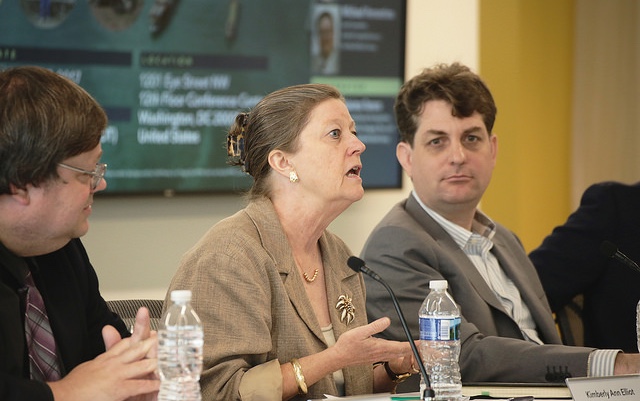Globalization and free trade remain controversial topics—and one of the most intensely debated issues is the impact of international trade policy on food security, particularly in developing countries. At the recent launch of a new IFPRI book, Agriculture, Development, and the Global Trading System: 2000-2015, participants discussed this complex relationship, focusing on the role of the World Trade Organization (WTO) in making globalization work efficiently and for everyone.
David Laborde, co-editor and Senior Research Fellow in IFPRI’s Markets, Trade and Institutions Division (MTID), opened the event by emphasizing that trade is not just an economic issue. “The less integrated the world is, the more conflict we see,” he said. “So we are not talking just about economic welfare. Trade is a source of peace.” Despite the benefits that trade can bring, however, many people—policy makers and average people alike—still fear trade liberalization for a variety of reasons. Multilateral organizations like the WTO, Laborde said, can play an important part in allaying those fears by setting and enforcing rules to make international trade more fair and transparent. “Without rules, it’s hard to get healthy cooperation,” he concluded.
Determining rules and trade policies that are fair to both developed and developing countries and that help rather than hinder food security is a key challenge, said Antoine Bouët, co-editor and Senior Research Fellow with MTID. The gains made from the WTO’s Doha Development Round negotiations have been limited, and the threat of trade wars has the potential to further harm global development.
In addition, several new trends have recently emerged in countries’ agricultural trade policies. Those of developed countries have become less trade-distorting over the past 15 years, while emerging countries like India and China have significantly increased their use of trade-distorting domestic support for agriculture. Many countries are also again discussing the use of food stockpiles for food security; according to Bouët, food stocks often have too many objectives (emergency food aid, food redistribution, and support for farmers’ incomes) to be truly useful.
In the face of these new trends and following on the failure of the Doha Round, a new round of trade negotiations under the framework of the WTO is needed, Bouët said. He also emphasized the need for other policy approaches, such as cash and in-kind transfers, to help address food security issues. “There is always a downside to free trade; that’s why negotiations and fiscal policies are key,” he concluded.
“WTO Members need to end the Doha Round and move on to a new round of negotiations to move things forward,” agreed Kimberly Ann Elliott, a Visiting Fellow at the Center for Global Development. The challenge comes from the heterogeneous nature of WTO membership—reaching agreements among countries with varied, sometimes competing, interests has proven near impossible. One possible solution is the use of plurilateral rather than multilateral agreements; these would allow member countries to agree to new rules on a voluntary, rather than mandatory, basis. However, plurilateral agreements may prove ineffective, Elliott pointed out, if major trading countries, such as China or India, stay out.
Another potential approach is to address one sector at a time. “One of the lessons of the Doha Round has been that lumping all issues together in one negotiation round has failed,” Elliott said. “There may be enough material in the agricultural sector alone to establish its own round.”
Michael Ferrantino, Lead Economist of the Trade and Competitiveness Global Practice of the World Bank, emphasized the murky political waters that policymakers must navigate when instituting trade and food security-related policies. For example, agricultural protection may be good for domestic producers but harms consumers and the global market. Similarly, food stockpiling may be viewed as helpful in protecting against domestic food crises, but it can also carry high costs and is difficult to administer effectively. Food crises also make it hard to enact effective policies while simultaneously keeping constituents satisfied, Ferrantino said. “In food crisis, there is a moral dimension, and some policies may be counterintuitive,” he said. For example, allowing food exports during a domestic food shortage would help to maintain or improve global food security as a whole, but would likely face significant domestic pushback.
There was a clear consensus among the participants that the WTO, despite its imperfections, remains the best available framework through which to establish fair, transparent international trade. Moderator Maximo Torero, Executive Director for Argentina, Bolivia, Chile, Paraguay, Peru, and Uruguay at the World Bank, emphasized the need for strong data-driven evidence, like that provided in Agriculture, Development, and the Global Trading System: 2000-2015, to inform both policymakers and WTO trade negotiators. “We can simplify language, but we don’t need to simplify ideas. We need to provide the best possible evidence,” Torero concluded. “Climate change, food security, and conflict are realities, and we need informed policies to prepare ourselves.”
Sara Gustafson is a Communications Specialist with IFPRI’s Markets, Trade and Institutions Division.







